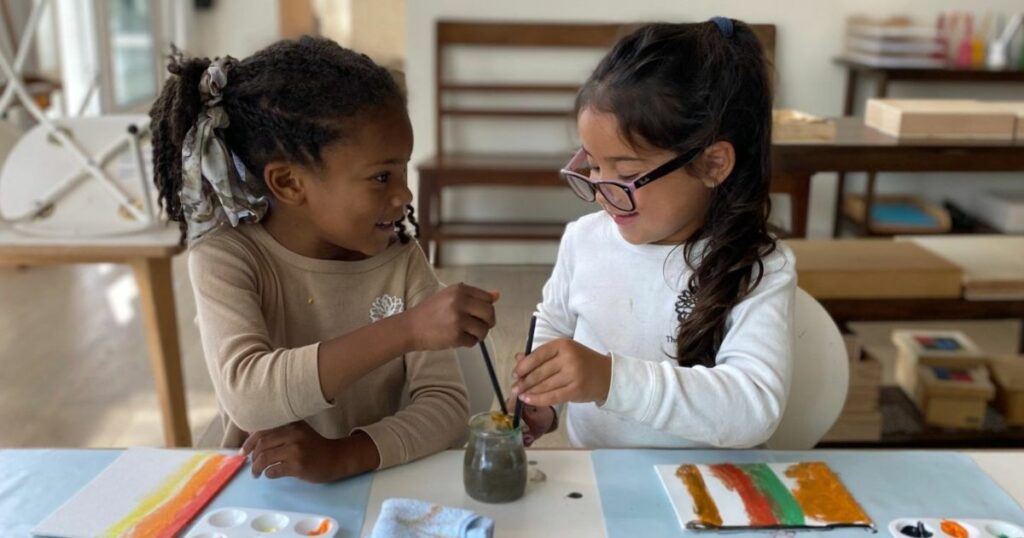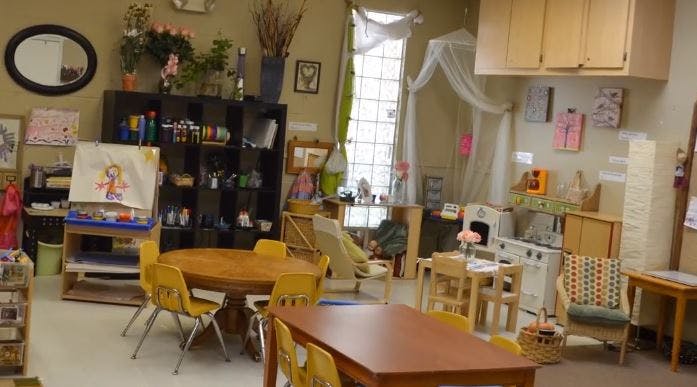
After all, it’s a cornerstone of our Montessori practice and one of the most important keys to fully educating a child. It’s not unusual for us to advocate for children’s independence.
It’s also worth noting that the definition of independence varies greatly depending on your child’s developmental stage. It’s simply amazing to see what a child is capable of when we meet them where they are and give them opportunities to do things for themselves.
Here are a few suggestions for parents who want to encourage their child’s independence.
#1 Infants: Freedom of Movement
Our cute newborn babies are never small for long. They soon learn to roll over, scoot, sit, crawl, stand, and even walk. These special occasions are thrilling when they occur. But in retrospect- they seem to pass in a blur.
One of your baby’s most important tasks will be to learn how to move independently. They are instinctively motivated to do so, and as adults, we can assist them in this endeavor.
One choice that some parents make (please know we understand it’s not a perfect choice for every family) is to give their infant a floor bed. Rather than being confined to a crib, this allows your growing baby to explore the environment independently when they wake up in the morning.
Using a floor bed means creating a bedroom environment that is completely safe and developmentally appropriate for your baby to explore independently; consider laying a soft carpet on the floor and having a low shelf with simple toys they can access.
Many parents find that rather than awaiting their child’s cries to be lifted from a crib in the morning, the child instead spends quite a bit of time moving and playing quietly.
Another big tip we have for parents of infants is when your child is learning to walk; they are not very good at it. The only way for them to get better is to practice, and they have a strong drive to do so as much as possible. Although it may force us as parents to slow down and plan extra time into our schedules- consider relying a little less on carrying and strollers, and a little more on giving your child time to use their developing skills.
#2 Toddlers: Getting Dressed
This is possibly the most entertaining section of the entire article. Toddlers learning to dress are not only learning an important skill, but they are also adorable.
Begin with a limited number of options. Allow your child to choose between two different shirts, then demonstrate how to put them on. They will require a lot of assistance at first, but as time passes, resist the urge to insert their tiny hands into the sleeves and give them a chance to figure it out on their own. They’ll do it. It will take time and many failed attempts, but with each attempt, they will get closer to being able to do it themselves.

Your child may eventually choose their entire outfit. Another useful tip is to plan (or have them plan) a week’s worth of outfits ahead of time. Hang a sufficient number of low hooks on your child’s bedroom wall and allow them to choose and dress themselves each day. As with anything, progress will be slow at first. But in the long run, the independence gained saves time and instills critical feelings of confidence.
After you’ve completed the preceding steps, all that’s left to do is sit back and enjoy the interestingly matched items of clothing and the smile on your child’s face.
#3 Primary-aged: Helping Tasks
Surprisingly, children between the ages of 3 and 6 enjoy doing chores. By assisting them in learning and participating in important daily tasks when they are young, you instill habits that will last a lifetime in them.
Our children observe us going about our daily activities and want to be a part of what we do. They aspire to be like us. So when they see you sweeping the floor, they want to pitch in. Whether it is dusting or cooking your child wants to help you with everything. Allow them!

There are different tasks that young children are perfectly capable of completing (or at the very least, assist with). Rather than listing them all, we’d like to share some general guidelines to help guide you through the process.
- Pay attention to your child’s interests. They will let you know what they want to try, whether through actions or words.
- Make time to slow down and allow this work to happen. Will it take them ten times as long to clean up their mess as it would if you did it for them? Absolutely. However, putting in the time now will be well worth it in the long run.
- Accept miscalculations. Teach them to be open to making mistakes. We learn through mistakes.
- Learn to see chores as contributions to our families that we all make. Everyone (including children) becomes a member of a team when they work together. Your child will take great pride in their work if they approach it in this manner.
#4 Elementary-aged: Trust Moments
This step varies greatly from child to child and from family to family. The values and comfort level of your family, as well as your child’s individual development and abilities, should be carefully considered.
During the elementary school years, your child is ready to venture out on their own in small ways. Allowing them to do so can be thrilling for them but terrifying for us. Take it slowly and thoroughly discuss what each new freedom entails.
Essentially, you’re looking for small ways to give your child opportunities to be safe, trustworthy, and self-sufficient. Here are some examples:
– Playing alone in the backyard –
Set clear boundaries and expectations. You may be keeping a close eye out the kitchen window at first, but in time, this will become an excellent option for both your child and you.
-Retrieving items at the grocery store –
Begin by asking them to grab something in your line of sight, then gradually ask them to retrieve an item from one or two aisles over. As a bonus, this will expedite your shopping trip!
– Walking the dog/getting the mail –
As with playing alone in the yard, establish clear safety rules and discuss “what ifs.” What will your child do if they hear a car approaching? What if the dog chases a squirrel? Ask these questions again and again until you are confident that they understand.
Visiting a friend’s house –
This is not a new concept, but as children grow older, they will want to spend more time with their friends. Discuss how they might handle various situations, also how they might contact you if necessary.
Babysitting-
Initially, this may imply that your 8-year-old reads to their 4-year-old sibling while you cook dinner. However, by the end of elementary school, your child may be ready to take on some real babysitting responsibilities.
#5 Adolescents: Exploring Interests
As your child grows older and approaches adulthood, they will naturally begin to pursue new interests as they discover who they are and what they enjoy. All they need from us is our help with this investigation. It will cover a wide range of topics, from hobbies to potential careers.
We spend many years caring for our children when they are young, providing them with every advantage possible so that they can grow into successful and happy adults. Nothing, however, can fully prepare us for this eventuality. And the future we envision for our children may be very different from the future they envision for themselves.
We like to remind ourselves at these times that we have worked hard to guide our child’s independence. They are unique individuals capable of making difficult decisions. They will make silly mistakes, but they will also amaze us.
Throughout their lives, our children frequently seek our advice and support. Perhaps the most satisfying feeling of all is taking a step back and appreciating that this one-of-a-kind human being, who sets out to make their mark on the world, let us hold their hand for a few years while they figured out how to do it.
In a Nutshell:
Supporting a child’s independence is one of the factors that every parent must consider. A child’s independence is important because it fosters self-esteem and confidence, and motivation, and perseverance in school. It promotes self-reliance, allowing your child to feel in control of their life. It teaches them self-motivation because they are free to find their reasons to succeed. When it comes to children’s independence, following Montessori principles is the best option. It’s not unusual for us to advocate for children’s independence. Also, finding the best Montessori school is also one of the important things that every parent should consider.






